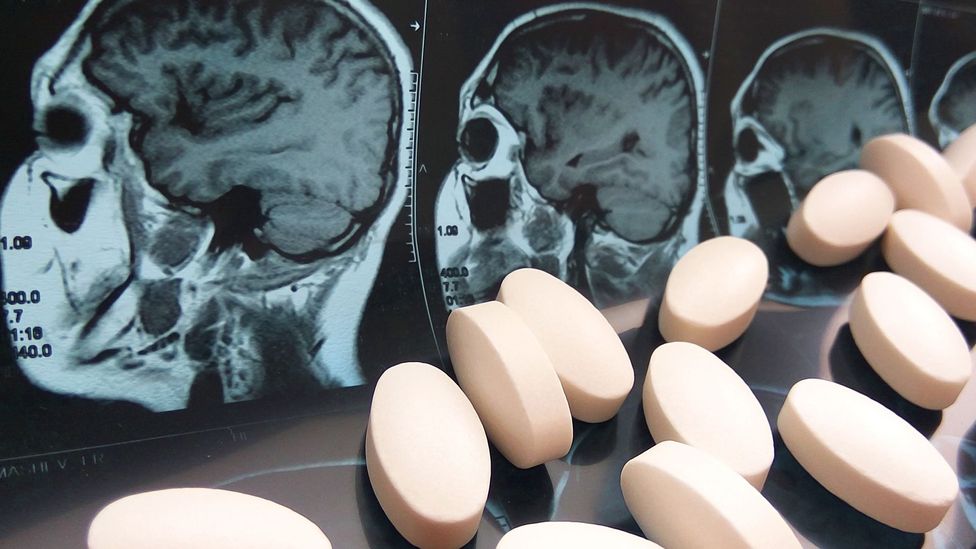Ken Recieved a Score of 125 on the Wais and Is Taking It Again in Three Weeks
The medications that change who we are
(Image credit:
Getty Images
)

They've been linked to road rage, pathological gambling, and complicated acts of fraud. Some make united states less neurotic, and others may even shape our social relationships. It turns out many ordinary medications don't simply bear upon our bodies – they affect our brains. Why? And should there be warnings on packets?
T
To marker the cease of a turbulent yr, we are bringing back some of our favourite stories for BBC Futurity's "Best of 2020" collection. Discover more of our picks hither .
"Patient V" was in his late 50s when a trip to the doctors changed his life.
He had diabetes, and he had signed upwardly for a report to encounter if taking a "statin" – a kind of cholesterol-lowering drug – might help. Then far, and then normal.
Simply soon after he began the handling, his wife began to observe a sinister transformation. A previously reasonable human, he became explosively angry and – out of nowhere – developed a trend for road rage. During i memorable episode, he warned his family to go on away, lest he put them in infirmary.
Out of fright of what might happen, Patient Five stopped driving. Even as a passenger, his outbursts often forced his married woman to abandon their journeys and plow back. Afterwards, she'd leave him alone to sentinel Telly and calm down. She became increasingly fearful for her own safety.
Then one day, Patient Five had an epiphany. "He was like, 'Wow, information technology really seems that these bug started when I enrolled in this study'," says Beatrice Golomb, who leads a research grouping at the Academy of California, San Diego.
You might also like:
- Why some people become sudden geniuses
- The mood-altering power of the Moon
- Are digital drugs the time to come of medication?
Alarmed, the couple turned to the report's organisers. "They were very hostile. They said that the two couldn't possibly exist related, that he needed to keep taking the medication, and that he should stay in the study," says Golomb.
Ironically, by this betoken the patient was and then cantankerous that he flatly ignored the doctors' advice. "He swore roundly, stormed out of the role and stopped taking the drug immediately," she says. Two weeks later, he had his personality back.
Others have non been so lucky. Over the years, Golomb has collected reports from patients across the United States – tales of broken marriages, destroyed careers, and a surprising number of men who have come unnervingly close to murdering their wives. In almost every example, the symptoms began when they started taking statins, then promptly returned to normal when they stopped; 1 human repeated this cycle five times before he realised what was going on.

Antidepressants may not just lighten moods, they may also reduce expressions of neuroticism, inquiry suggests (Credit: Getty Images)
According to Golomb, this is typical – in her feel, almost patients struggle to recognise their own behavioural changes, let alone connect them to their medication. In some instances, the realisation comes too tardily: the researcher was contacted past the families of a number of people, including an internationally renowned scientist and a erstwhile editor of a legal publication, who took their ain lives.
Nosotros're all familiar with the listen-bending backdrop of psychedelic drugs – but it turns out ordinary medications tin can be just as strong. From paracetamol (known as acetaminophen in the US) to antihistamines, statins, asthma medications and antidepressants, there'due south emerging evidence that they tin make us impulsive, angry, or restless, diminish our empathy for strangers, and even manipulate central aspects of our personalities, such as how neurotic we are.
In almost people, these changes are extremely subtle. Just in some they tin also exist dramatic.
Back in 2011, a French male parent-of-two sued the pharmaceutical visitor GlaxoSmithKline, claiming that the drug he was taking for Parkinson's affliction had turned him into a gambler and gay sexual activity aficionado, and was responsible for risky behaviours that had led to him being raped.
And so in 2015, a human being who targeted immature girls on the internet used the argument that the anti-obesity drug Duromine made him do information technology – he said that it reduced his ability to control his impulses. Every now and once again, murderers try to arraign sedatives or antidepressants for their offences.
If these claims are true, the implications are profound. The list of potential culprits includes some of the most widely consumed drugs on the planet, significant that even if the effects are small at an individual level, they could be shaping the personalities of millions of people.
Research into these effects couldn't come up at a ameliorate time. The world is in the midst of a crunch of over-medication, with the US alone buying upward 49,000 tonnes of paracetamol every twelvemonth – equivalent to nigh 298 paracetamol tablets per person – and the average American consuming $1,200 worth of prescription medications over the aforementioned period. And as the global population ages, our drug-lust is fix to spiral even further out of control; in the Britain, 1 in 10 people over the historic period of 65 already takes 8 medications every calendar week.

In the United states, more 49,000 tons of paracetamol is consumed every year - the equivalent of 298 pills per person (Credit: Getty Images)
How are all these drugs affecting our brains? And should there exist warnings on packets?
Of grade, no one is suggesting that people should stop taking their medications, which may be lifesaving – if you lot have whatever concerns, the best course of action is to speak to a doc. Nevertheless, there's a growing sensation of the importance of inquiry in this area, which may lead to ameliorate pharmaceutical drugs or a more nuanced analysis of their risks and benefits.
Golomb first suspected a connection between statins and personality changes nearly two decades ago, afterwards a serial of mysterious discoveries, such every bit that people with lower cholesterol levels are more likely to die violent deaths. Then one twenty-four hour period, she was chatting to a cholesterol expert about the potential link in the hallway at her piece of work, when he brushed it off as obviously nonsense. "And I said 'how do we know that?'," she says.
Filled with fresh decision, Golomb scoured the scientific and medical literature for clues. "At that place was shockingly more evidence than I had imagined," she says. For one thing, she uncovered findings that if you put primates on a depression-cholesterol nutrition, they become more aggressive.
In that location was even a potential mechanism: lowering the animals' cholesterol seemed to impact their levels of serotonin, an of import brain chemical idea to be involved in regulating mood and social behaviour in animals. Even fruit flies beginning fighting if you mess up their serotonin levels, only information technology also has some unpleasant effects in people – studies accept linked it to violence, impulsivity, suicide and murder.
If statins were affecting people's brains, this was probable to be a directly event of their power to lower cholesterol.
Since then, more direct evidence has emerged. Several studies have supported a potential link between irritability and statins, including a randomised controlled trial – the gold-standard of scientific research – that Golomb led, involving more than ane,000 people. It found that the drug increased aggression in post-menopausal women though, oddly, non in men.
In 2018, a study uncovered the same consequence in fish. Giving statins to Nile tilapia fabricated them more confrontational and – crucially – altered the levels of serotonin in their brains. This suggests that the machinery that links cholesterol and violence may have been around for millions of years.
Golomb remains convinced that lower cholesterol, and, by extension, statins, can cause behavioural changes in both men and women, though the strength of the effect varies drastically from person to person. "There are lines of evidence converging," she says, citing a study she conducted in Sweden, which involved comparing a database of the cholesterol levels of 250,000 people with local crime records. "Even adjusting for misreckoning factors, it was even so the case that people with lower cholesterol at baseline were significantly more than likely to be arrested for vehement crimes.".

Fruit flies become more aggressive when their serotonin levels become mixed up, enquiry has shown (Credit: Getty Images)
But Golomb's most unsettling discovery isn't so much the impact that ordinary drugs can take on who we are – it's the lack of interest in uncovering it. "There's much more of an emphasis on things that doctors tin can easily measure," she says, explaining that, for a long fourth dimension, inquiry into the side-effects of statins was all focused on the muscles and liver, because whatsoever issues in these organs can be detected using standard blood tests.
This is something that Dominik Mischkowski, a pain researcher from Ohio University, has also noticed. "At that place is a remarkable gap in the research really, when information technology comes to the effects of medication on personality and behaviour," he says. "We know a lot about the physiological effects of these drugs – whether they have physical side furnishings or not, you know. Only we don't sympathize how they influence human behaviour."
Mischkowski'southward own research has uncovered a sinister side-consequence of paracetamol. For a long time, scientists have known that the drug blunts physical pain by reducing activity in certain brain areas, such equally the insular cortex, which plays an of import part in our emotions. These areas are involved in our feel of social hurting, likewise – and intriguingly, paracetamol tin can make us experience meliorate afterward a rejection.
And contempo research has revealed that this patch of cerebral real-estate is more than crowded than anyone previously thought, because it turns out the brain'south pain centres also share their home with empathy.
For example, fMRI (functional magnetic resonance imaging) scans have shown that the same areas of our encephalon become active when nosotros're experiencing "positive empathy" –pleasance on other people's behalf – as when we're experiencing pain.
Given these facts, Mischkowski wondered whether painkillers might exist making it harder to feel empathy. Earlier this twelvemonth, together with colleagues from Ohio Academy and Ohio Country University, he recruited some students and spilt them into 2 groups. I received a standard 1,000mg dose of paracetamol, while the other was given a placebo. So he asked them to read scenarios about uplifting experiences that had happened to other people, such every bit the good fortune of "Alex", who finally plucked up the backbone to ask a daughter on a appointment (she said yes).

L-dopa is the most successful treatment for Parkinson'southward, but it can have side effects, making people act more than impulsively (Credit: Getty Images)
The results revealed that paracetamol significantly reduces our ability to feel positive empathy – a result with implications for how the drug is shaping the social relationships of millions of people every 24-hour interval. Though the experiment didn't expect at negative empathy – where we experience and relate to other people's pain – Mischkowski suspects that this would also be more difficult to summon subsequently taking the drug.
"I'one thousand not entirely junior anymore every bit a researcher, and to exist honest, this line of research is really the most worrisome that I've ever conducted," he says. "Particularly considering I'1000 well aware of the numbers [of people] involved. When you give somebody a drug, you don't just give it to a person – you give it to a social system. And we really don't empathize the furnishings of these medications in the broader context."
Empathy doesn't simply determine if yous're a "nice" person, or if you cry while you're watching deplorable movies. The emotion comes with many practical benefits, including more stable romantic relationships, meliorate-adjusted children, and more successful careers – some scientists have fifty-fifty suggested that it'south responsible for the triumph of our species. In fact, a quick glance at its many benefits reveals that casually lowering a person'due south ability to understand is no little matter.
Technically, paracetamol isn't changing our personalities, because the effects but terminal a few hours and few of us take information technology continuously. Just Mischkowski stresses that we exercise need to be informed nigh the ways it affects united states of america, so that nosotros can use our common sense. "Just like nosotros should exist aware that yous shouldn't go far front of the bicycle if you're under the influence of alcohol, yous don't want to have paracetamol and and then put yourself into a situation that requires you lot to be emotionally responsive – similar having a serious chat with a partner or co-worker."
One reason medications tin have such psychological clout is that the body isn't only a bag of separate organs, awash with chemicals with well-divers roles – instead, information technology's a network, in which many different processes are linked.
For case, scientists have known for a while that the medications used to treat asthma are sometimes associated with behavioural changes, such as an increase in hyperactivity and the development of ADHD symptoms. Then, more than recently, research uncovered a mysterious connection between the 2 disorders themselves; having one increases the risk of having the other by 45-53%. No one knows why, but ane idea is that asthma medications bring on ADHD symptoms past altering levels or serotonin or inflammatory chemicals, which are idea to be involved in the development of both conditions.

There have been many reports of severe psychological change from the use of statins (Credit: Getty Images)
Sometimes these links are more obvious. Back in 2009, a squad of psychologists from Northwestern University, Illinois, decided to check if antidepressants might be affecting our personalities. In particular, the team were interested in neuroticism. This "Big Five" personality trait is epitomised by anxious feelings, such equally fright, jealousy, envy and guilt.
For the study, the squad recruited adults who had moderate to severe depression. They gave one third of the report'due south participants the antidepressant paroxetine (a kind of selective serotonin reuptake inhibitor (SSRI)), one third a placebo, and one third talking therapy. They then checked to run across how their mood and personalities inverse from the beginning to the end of a 16-week treatment.
"We establish that massive changes in neuroticism were brought about by the medicine and not very much at all by the placebo [or the therapy]," says Robert DeRubeis, who was involved in the study. "It was quite striking."
The big surprise was that, though the antidepressants did brand the participants feel less depressed, the reduction in neuroticism was much more powerful – and their influence on neuroticism was contained of their impact on low. The patients on antidepressants as well started to score more than highly for extroversion.
Information technology'southward of import to annotation that it was a relatively small report, and no 1 has tried to repeat the results yet, so they may not be totally reliable. But the idea that antidepressants are affecting neuroticism direct is intriguing. One thought is that the trait is linked to level of serotonin in the brain, which is contradistinct by the SSRIs.
While condign less neurotic might sound like an appealing side-effect, it's not necessarily all good news. That's because this aspect of our personalities is something of a double-edged sword; aye, it'southward been associated with all kinds of unpleasant outcomes, such every bit an earlier death, but it's also thought that anxious over-thinking might be helpful. For example, neurotic individuals tend to be more than run a risk-averse, and in certain situations worrying can improve a person's performance.

Cholesterol-lowering drugs save tens of thousands of lives every twelvemonth, so people should seek medical communication before stopping taking them (Credit: Getty Images)
"What [the American psychiatrist] Peter Kramer warned us about was that when some people are on antidepressants, what can happen is that they begin not to care almost things that people intendance virtually," says DeRubeis. If the results practise concur upward, should patients be warned about how their treatment might change them?
"If I were advising a friend, I would certainly desire them to be on the sentry for those kinds of undesirable effects, just similar they would naturally be looking out for other side-effects, like whether they're gaining weight, then on," says DeRubeis.
At this point it's worth pointing out that no ane is arguing that people should stop taking their medication. Despite their subtle effects on the encephalon, antidepressants have been shown to help preclude suicides, cholesterol-lowering drugs relieve tens of thousands of lives every year, and paracetamol is on the World Health Organisation's list of essential drugs considering of its ability to salve pain. But it is of import that people are informed near any potential psychological side-effects.
The matter takes on a whole new urgency, when you consider that some personality changes tin be dramatic. There's solid show that the drug L-dopa, which is used to treat Parkinson's disease, increases the risk of Impulse Command Disorders (ICDs) – a group of problems that make it more than difficult to resist temptations and urges.
Consequently, the drug can accept life-ruining consequences, as some patients suddenly outset taking more than risks, becoming pathological gamblers, excessive shoppers, and sex pests. In 2009, a drug with like properties hitting the headlines, subsequently a human being with Parkinson'due south committed a £45,000 ($threescore,000) ticket scam. He blamed it on his medication, claiming that it had completely changed his personality.
The clan with impulsive behaviours makes sense, because 50-dopa is essentially providing the brain with a dose of extra dopamine – in Parkinson's illness the part of the brain that produces it is progressively destroyed – and the hormone is involved in providing us with feelings of pleasure and reward.
Experts agree that L-dopa is the virtually effective treatment for many of the symptoms of Parkinson's disease, and it's prescribed to thousands of people in the US every year. This is despite a long list of possible side effects that accompanies the medication, which explicitly mentions the take chances of unusually stiff urges, such as for gambling or sex.
In fact, DeRubeis, Golomb and Mischkowski are all of the stance that the drugs they're studying will continue to exist used, regardless of their potential psychological side-effects. "We are human beings, you know," says Mischkowski. "Nosotros take a lot of stuff that is not necessarily always adept in every circumstance. I always utilize the example of alcohol, because information technology's likewise a painkiller, like paracetamol. We accept it considering we feel that it has a benefit for u.s.a., and information technology's OK every bit long as you take information technology in the right circumstances and you don't consume too much.".
But in gild to minimise any undesirable furnishings and get the most out of the staggering quantities of medications that we all take each day, Mischkowski reiterates that we need to know more. Considering at the moment, he says, how they are affecting the behaviour of individuals – and fifty-fifty entire societies – is largely a mystery.
--
Disclaimer
All content within this cavalcade is provided for general information only, and should non be treated every bit a substitute for the medical advice of your own doctor or whatsoever other health care professional person. The BBC is not responsible or liable for whatever diagnosis made past a user based on the content of this site. The BBC is not liable for the contents of any external internet sites listed, nor does information technology endorse any commercial product or service mentioned or advised on any of the sites. Always consult your own GP if y'all're in whatever manner concerned nigh your health.
--
Join 1 million Future fans by liking us on Facebook , or follow us on Twitter or Instagram .
If you liked this story, sign up for the weekly bbc.com features newsletter , called "The Essential List". A handpicked selection of stories from BBC Future, Culture, Worklife, and Travel, delivered to your inbox every Friday.
Source: https://www.bbc.com/future/article/20200108-the-medications-that-change-who-we-are